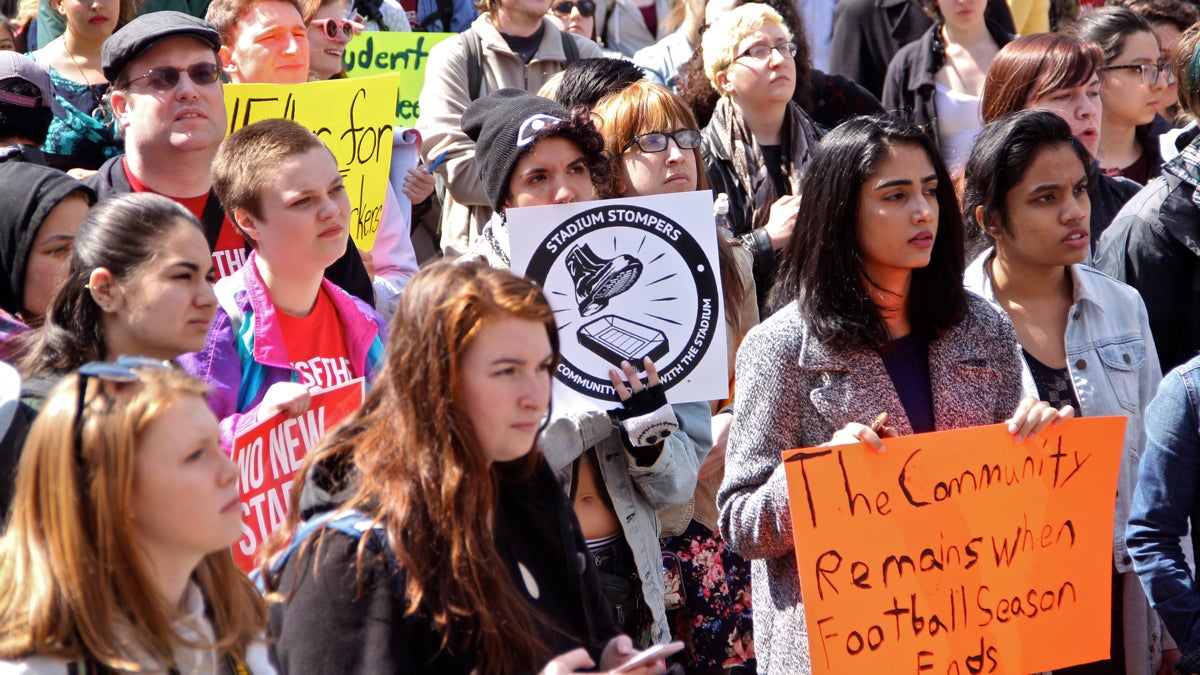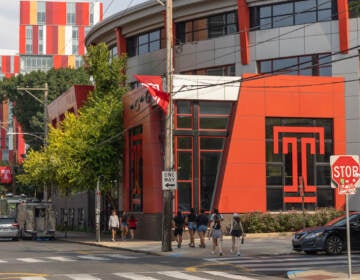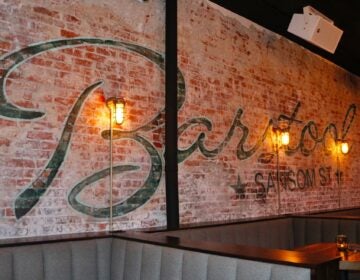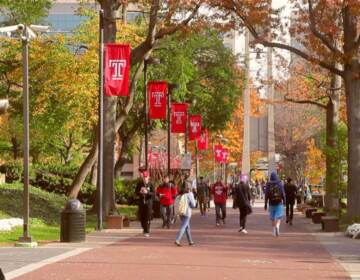Temple needs to invest in its own community, not a stadium
There’s a reason why a significant portion of America’s high school seniors are not prepared for entry-level college courses, and it boils down to priorities.

Temple University students rally against the building of a new football stadium. (Emma Lee/WHYY)
There’s a reason why a significant portion of America’s high school seniors are not prepared for entry-level college courses, and it boils down to priorities.
Case in point — my alma mater, Temple University, unveiled plans last year to build a new 35,000-seat stadium for its beloved football team near the main campus in North Philadelphia. A state school that is preparing 37,700 students for their careers, including 2,700 international students and thousands of learners who are financing their education through federal and private student loans, wants to build a stadium for one football team.
I get it. This is an exciting time for the Owls, and Temple is patting itself on the back for increasing its football spending and getting a substantial return on that decision.
But let’s think about this. Does a football team having one really amazing season after a 25-year slump validate the university’s decision to build a stadium?
The answer is no. Here’s why.
A stadium will not inspire the Owls to be more or less successful. Or profitable.
Saying that a football team will win more games by having its own football stadium is like me saying that the meals I prepare will taste better if I build a bigger kitchen. Only practice and teamwork can make the Temple Owls a better football team.
And then there’s the question no one has addressed yet: What happens when the slump returns and Temple football fans stop coming to games? The cost of running a stadium doesn’t go away when the fans do. When that happens, where is university President Neil D. Theobald going to get the money to cover those costs? The answer may involve scaling down the school’s athletic division even further, or taking money away from students who need help covering their tuition costs.
North Philadelphia families and small businesses will not reap the benefits of a new stadium in their neighborhood.
You can’t blame North Philly residents for their reaction to stadium plans. Aside from the realization that a local park and recreation center would need to be destroyed to make room for it, there’s been no word from Temple yet about where 35,000 football fans will park during the season. Unless a parking garage is included with the stadium plan, residents can expect fewer options for parking, and businesses risk losing loyal customers who can’t find places to park nearby.
How local residents will benefit economically from the stadium is another burning question. The use of union labor will prevent the community from reaping the benefits of job growth during the construction phase, and there are no guarantees that Temple will staff its new stadium with local residents. The increased property values that will price low-income families and small business owners out of their rental spaces is another issue the university has yet to address as well.
The money would be better spent on Temple’s students and workforce.
If Temple has money to piss away on a stadium, then it should follow that Temple has money to cover tuition costs for low-income and international students, expand its career services for alumni, and provide pay raises for its current employees.
Let’s imagine for a second that Temple takes the $100 million it intended to raise for the stadium and instead invested it in its student body and workforce. For the cost of building the stadium, the university could cover a year of tuition costs for 6,600 Pennsylvania residents or 4,000 out-of-state students. Or it could give every faculty member an extra $12,000 for the school year. Or it could develop a comprehensive alumni services department that offers unlimited resume reviews, mock interviews, and networking opportunities in-person or online for the university’s 308,000 living alumni around the world.
When his university first announced plans to build a stadium for its football team, Theobald said, “Having our own stadium will help showcase our vibrant campus as we celebrate Temple’s accomplishments on and off the field.”
No. Having respect for the North Philadelphia community and investing $100 million in your students, faculty, and staff members is a better way to celebrate Temple’s accomplishments.
WHYY is your source for fact-based, in-depth journalism and information. As a nonprofit organization, we rely on financial support from readers like you. Please give today.




